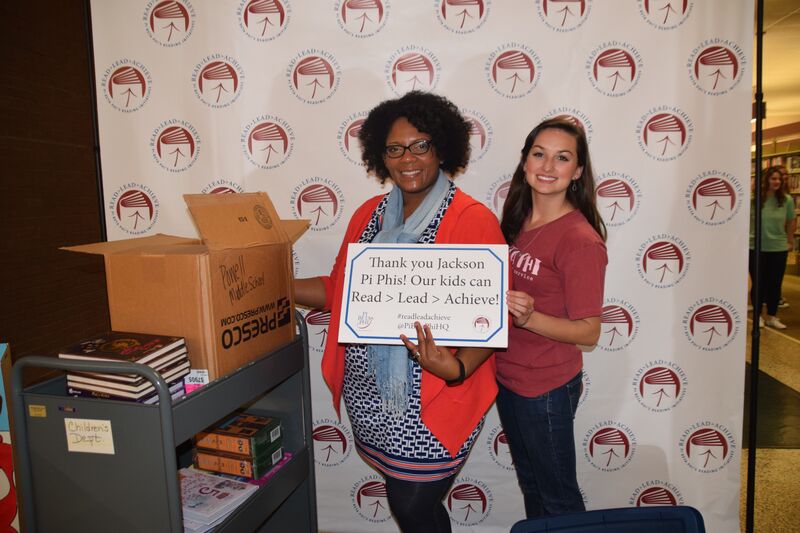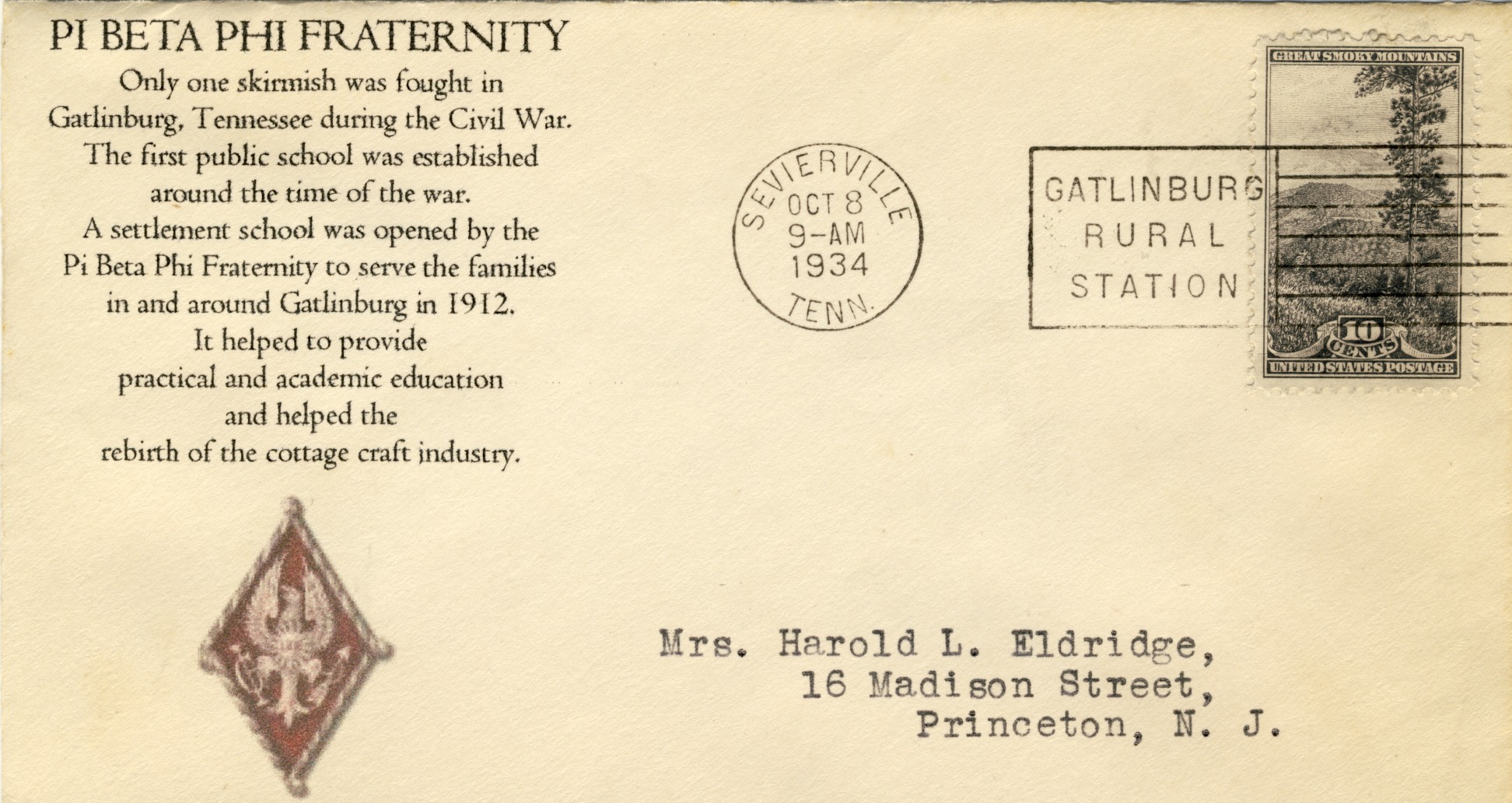philanthropy
Our founders knew the importance of giving back to their communities, and the earliest chapters raised funds to support libraries. The benefits of education have always been a driving force for Pi Beta Phi.
Our founders knew the importance of giving back to their communities, and the earliest chapters raised funds to support libraries. The benefits of education have always been a driving force for Pi Beta Phi.

“From the beginning, the I.C.s were interested in altruistic work.” The founders knew the importance of giving back to their communities to “dispel the gloom from the lives of all around them.” The Nebraska Alpha Chapter started a library in York, Nebraska, which it maintained for ten years before presenting it to the city. The importance of education and the benefits it can bring have always been a driving force for Pi Beta Phi. At the 1910 Convention, Emma Harper Turner proposed the establishment of a settlement school. This school would honor the twelve founders and would be established on the fiftieth anniversary of the Fraternity in 1917. The site chosen was the Appalachian Mountains, an area designated by the U.S. Bureau of Education at Washington as the most in need of education. Grand President May Lansfield Keller, Maryland Alpha, visited Gatlinburg, Tennessee, and was adamant that the Fraternity needed to place its school there.
Not only did the Settlement School provide much needed education for the local youth, but it created a market for the Gatlinburg community to sell their crafts — baskets, weaving and furniture. In 1922, the Jennie Nicol Memorial Hospital was opened and served the local medical needs and provide hygiene education to the community. For some of the students, the craft skills learned at the Settlement School meant “emancipation from tending the crop,” and by 1935, weaving was the big industry of Gatlinburg. “In 1924 the Grand Council and Settlement School Committee voted to secure and use a trademark for articles made at the School.” An arrowhead design was registered to represent the Arrowcraft trademark. The Settlement School lives on today in both Pi Beta Phi Elementary School, which is part of Sevier County Public Schools, and the Arrowmont School for Arts and Crafts.
 After World War II, Canadian Pi Phis felt that establishing a distinctly Canadian philanthropy would unify Pi Phis in Canada “and would create favorable public relations.” The Loan Fund was made available to the eight Canadian schools of social work and put into place in 1954. At the 1967 Convention, Arrow in the Arctic was established to commemorate the dual centennials of both Canada and Pi Beta Phi. “Money was sent to supply books to the libraries of the Yukon and Northwest Territories. The Canadian government supplied an adequate budget for the purchase of books, but there was no money available for extras such as expensive reference volumes. In July, 1967, a check for $1,000 was presented to the Commissioners of the Territories to be divided equally between the libraries.” Today, Arrow in the Arctic continues to support libraries in the most remote parts of the far North.
After World War II, Canadian Pi Phis felt that establishing a distinctly Canadian philanthropy would unify Pi Phis in Canada “and would create favorable public relations.” The Loan Fund was made available to the eight Canadian schools of social work and put into place in 1954. At the 1967 Convention, Arrow in the Arctic was established to commemorate the dual centennials of both Canada and Pi Beta Phi. “Money was sent to supply books to the libraries of the Yukon and Northwest Territories. The Canadian government supplied an adequate budget for the purchase of books, but there was no money available for extras such as expensive reference volumes. In July, 1967, a check for $1,000 was presented to the Commissioners of the Territories to be divided equally between the libraries.” Today, Arrow in the Arctic continues to support libraries in the most remote parts of the far North.

Most of Pi Beta Phi’s philanthropic endeavors have focused on literacy and education. Whether it’s providing education to and sharing the gift of reading in rural locations, helping out before and after the world wars or helping fund the isolated libraries of Canada’s north, Pi Phis have always believed in the power of philanthropy. “In 1990, Grand Council announced a new service project for clubs and chapters, Links to Literacy, joining a number of national groups to combat illiteracy, a critical problem in the United States.” Champions are Readers® (CAR), Pi Phi’s own reading enrichment program, was adapted by the Links to Literacy committee from a creative concept that originated with the Houston Alumnae Club. The CAR program enables volunteers to offer a turnkey reading enrichment program to their own schools and communities during a designated month of the school year. The CAR program can be used for one classroom or several, once during the year or repeated in the school year and can also be implemented at after-care programs. The options are numerous and flexible and can easily be modified. An important feature of this program is the recognition of the importance that family members participate in a child’s reading behavior and habits. It is also designed to be used by any size group of volunteers — from the smallest group to the largest — and not all volunteers are required to be members of Pi Beta Phi. While CAR remains today, Links to Literacy evolved over the years, and to better express the mission of the Fraternity, is now known as Read > Lead > Achieve®.
Read > Lead > Achieve is Pi Beta Phi’s philanthropic effort, which seeks to inspire a lifelong love of reading that can unlock true potential creating a more literate and productive society. The program encompasses all of Pi Beta Phi’s reading initiatives, which include Arrow in the Arctic, CAR and Fraternity Day of Service. Alumnae clubs and chapters across North America celebrate Fraternity Day of Service on or around March 2 by participating in numerous reading activities across North America, including Pi Phi’s five Signature Events which include the distribution of 20,000 brand new books each.
FDS500 became an extension of Fraternity Day of Service in 2014. Chapters and alumnae clubs can apply for FDS500 grants. The grants consist of 500 brand-new books that are made available through our partnership with First Book. There are 100 grants distributed to alumnae clubs and chapters, and the books are provided to a First Book recipient groups in the alumnae club and chapter’s local areas. Through their philanthropic efforts, Pi Phis have given away more than a million books and donated over a million dollars.
To create an army of Pi Phi volunteers who can effectively advocate for literacy, Pi Beta Phi introduced the Literacy Advocacy Project at the 2017 Convention. The Literacy Advocacy Project is a series of trainings presented in partnership with the Barbara Bush Foundation for Family Literacy which teach all aspects of literacy advocacy including what it means to be an advocate, why advocacy is important and the many ways one can advocate for literacy. The first five trainings were held in the fall of 2017 in: Atlanta, Phoenix, Seattle, St. Louis and Washington D.C.
The Literacy Fund at Pi Beta Phi Foundation plays a critical role in the success of Read > Lead > Achieve. Gifts to The Literacy Fund support all Pi Phi reading initiatives under Read > Lead > Achieve, including Champions are Readers, Arrow in the Arctic, Fraternity Day of Service, Pi Phi’s First Book® Partnership and much more. Additionally, the Foundation has the Local Impact Grants program, which provides grant opportunities to support reading in local communities. Chapters and alumnae clubs may nominate 25 percent of their gifts to The Literacy Fund for a local nonprofit organization with a mission or special program focus on literacy. The 25 percent will be matched by the Foundation, dollar for dollar.